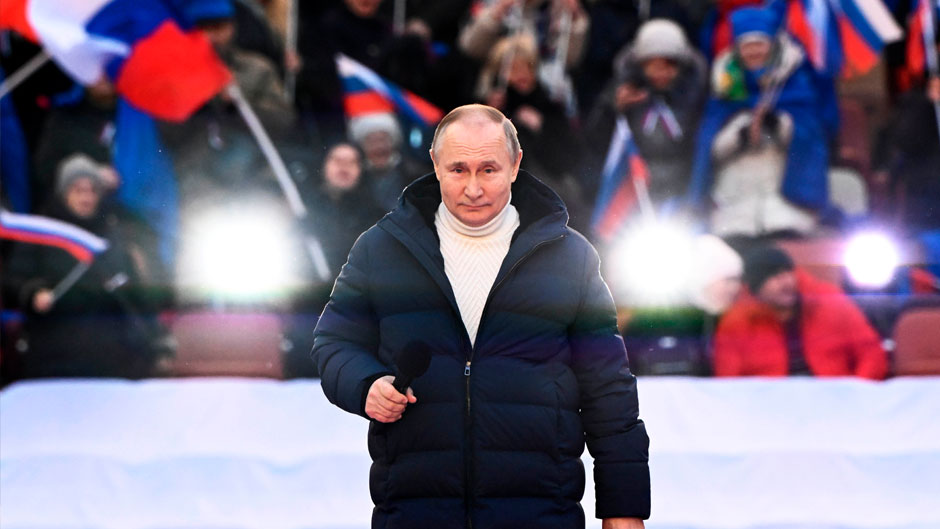While Russia continued bombing different sites in Ukraine, Russian president Vladimir Putin addressed a large crowd at a pro-war concert in Moscow recently and told the participants that the military actions were necessary to prevent a genocide against Russian citizens.
The event shows that the Russian propaganda machine is hard at work. The country is leading a campaign of disinformation and repression, according to Heidi Carr, a lecturer in the University of Miami School of Communication, who talked to students recently about the conflict.
“This is not just a war using bombs and tanks,” she said. “It’s a war using lies and propaganda as its main weapons.”
In the past weeks, Russia has silenced all independent media in the country. Putin has banned all social media platforms including Facebook, TikTok, Twitter, and Instagram. He has shut down all independent media and kicked out most international media including the BBC, Voice of America, and Radio Free Europe.
Only state-owned and controlled media is now operating in the country. Moreover, the Russian government has imposed a 15 year-prison sentence on anyone who reports what it calls “fake news.”
A Russian journalist who tried to tell the real story of the war during a live TV newscast was detained and fined more than $200. The staff of the independent Russian TV station, Dozhd (TV Rain), walked out on air while declaring “No to war” after being shut down because of its coverage of the Ukraine invasion.
Russia contends that the war is a “special military operation”—not an invasion—and that it was necessary to quell Nazis in Ukraine who are determined on destroying Russians.
“Russia is using some of the worst forms of propaganda—Soviet style—to lie to its own population,” said Sam Terilli, associate professor in the School of Communication. “By cutting off access to western media and western tech or social media sites, the Putin regime is simply trying to keep its citizens in the dark. It’s truly sad.”
Propaganda did not always have a negative connotation, he said. One description of the word says it is “a form of communication that is primarily used to influence or persuade an audience to further an agenda.”
By that definition, political campaigns and advertising are forms of propaganda. However, the word inherited a more sinister meaning when totalitarian governments used it to fulfill their own needs.
“Propaganda as a term took on a pejorative meaning during the 1930s and 1940s, largely as a result of Nazi propaganda,” said Terilli. “The fact is propaganda as a term has a long history and there is good propaganda and horrible propaganda.”
The propaganda the Russians are employing is among the worst, according to Terilli.“Some forms of propaganda are manipulative, false, and even dangerous in some ways,” he said. “Some can be falsely sourced to mislead people, and some may intentionally seek to play off prejudice, hatred, and fear. Those forms are among the worst.”
Carr outlined some of the fake news that Russia is spreading:
- The United States is funding bio warfare laboratories in Ukraine to produce chemicals to weaken or kill Russians. The toxins would be carried into the country by migrating birds.
- President Volodymyr Zelenskyy of Ukraine is a Nazi and so is his cabinet. They are dangerous, and they have camps where they are holding Ukrainians. (Zelenskyy is of Jewish descent, and his grandmother was a victim of the Holocaust.)
- The photos and videos of the Ukraine war are all “fake news.” The photos and videos are doctored and the people who look injured or dead are all hired actors.
- Russian soldiers were sent to Ukraine to liberate the Ukrainians, and are bringing them medicine, food, and blankets.
“These are the stories most Russians are seeing in their television and news feeds courtesy of the Russian-run media,” said Carr.
These messages are also being sent outside of Russia by its diplomats, she pointed out. Many of these ambassadors disseminate the false information to other countries via social media posts.
“The Russians have done so many things to shut the Russian people off from real news,” she said. “And, with Putin pulling the plug on Twitter, Facebook, TikTok, and Instagram, people within Russia have no access to real news being shared.”
The draconian measures imposed by Putin on the press have led independent and international media outlets to make some difficult decisions. For example, The New York Times has pulled its journalists out of Russia.
All this censorship means that residents in Russia are being kept in the dark about the real facts surrounding the conflict with Ukraine, Carr noted. “It means that Russia is losing the propaganda war globally,” she said. “But it is winning the propaganda war internally.”

